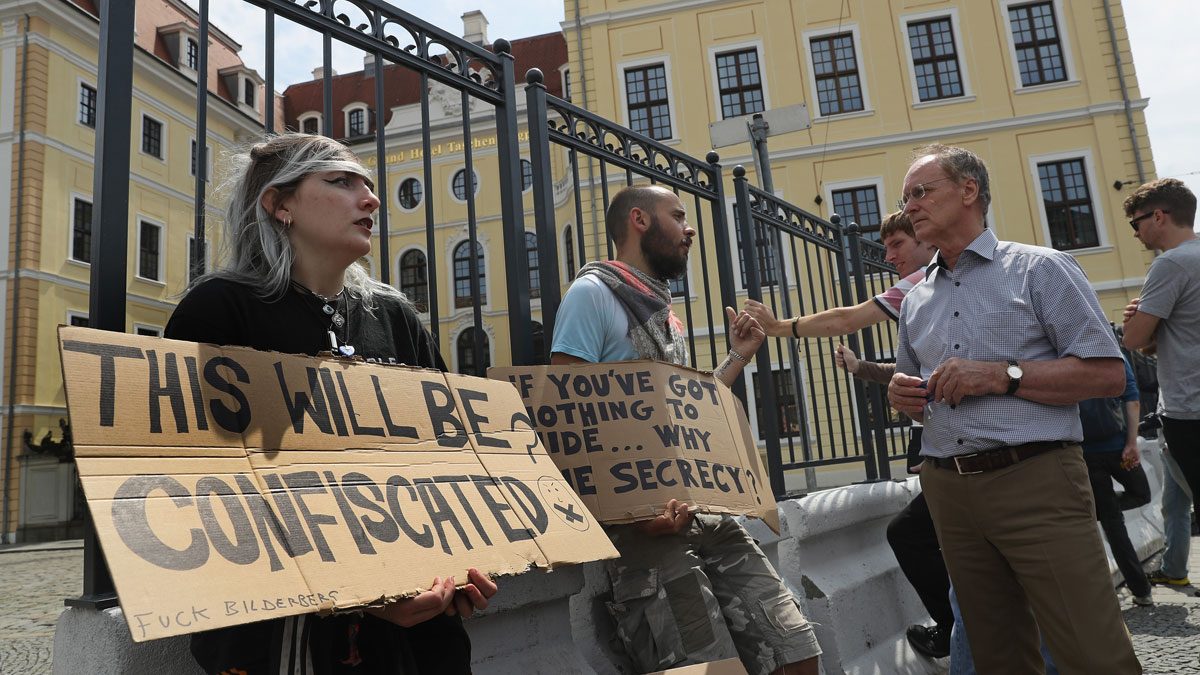Bilderberg conference: Who is going and what will they discuss?
Conspiracy theorists say group aims to form a New World Order and could be composed of 'shape-shifting lizards'

A free daily email with the biggest news stories of the day – and the best features from TheWeek.com
You are now subscribed
Your newsletter sign-up was successful
Members of the global elite are gathering in Dresden today for the annual Bilderberg conference.
The clandestine meeting – closed to reporters, guarded by undercover agents and bound by strict secrecy rules – has long been a favourite of conspiracy theorists
What is the Bilderberg Group?
The Week
Escape your echo chamber. Get the facts behind the news, plus analysis from multiple perspectives.

Sign up for The Week's Free Newsletters
From our morning news briefing to a weekly Good News Newsletter, get the best of The Week delivered directly to your inbox.
From our morning news briefing to a weekly Good News Newsletter, get the best of The Week delivered directly to your inbox.
Founded 60 years ago by Prince Bernhard of the Netherlands, it brings together senior politicians, economists, security experts and business people from Europe and North America.
The group says the annual conference is meant to foster dialogue on major issues facing the world.
Who will be there?
The guest list includes former CIA director David Petraeus and ex-MI6 chief Sir John Sawers, as well as the bosses of Google, Shell, BP and Deutsche Bank.
A free daily email with the biggest news stories of the day – and the best features from TheWeek.com
A select few journalists, including The Economist's editor-in-chief Zanny Minton Beddoes, have also been invited - but will be sworn to secrecy.
Notably absent will be Chancellor George Osborne and Prime Minister David Cameron, who have both attended in recent years.
What will they discuss?
The possibility of Britain leaving the European Union is expected to top the agenda, alongside the struggling Chinese economy, low oil prices and the risk of Donald Trump reaching the White House.
For Bilderberg, "the idea that there might be any kind of push-back against globalisation is a horrific one", Charlie Skelton writes for the International Business Times.
"I suspect we'll glimpse some frowning faces behind the tinted glass as the limousines start rolling up," the journalist adds.
Why are conspiracy theorists so interested
The meetings are held under the Chatham House Rule, a convention that allows speakers to advance unpopular opinions without fear of being identified.
"There is no detailed agenda, no resolutions are proposed, no votes are taken and no policy statements are issued," the group says.
Conspiracy theorists have long believed the Bilderberg Group is actually a puppet master controlling global governments and shaping world politics and have long accused it of trying to form a New World Order.
Bilderberg is said variously to have launched the career of Margaret Thatcher, to control fleets of black helicopters and even to be secretly composed of giant shape-shifting lizards, bent on ruling the world.
"To say we are striving for a one-world government is exaggerated, but not wholly unfair," admitted founding member Denis Healey in 2014. "We felt that a single community throughout the world would be a good thing."
-
 How the FCC’s ‘equal time’ rule works
How the FCC’s ‘equal time’ rule worksIn the Spotlight The law is at the heart of the Colbert-CBS conflict
-
 What is the endgame in the DHS shutdown?
What is the endgame in the DHS shutdown?Today’s Big Question Democrats want to rein in ICE’s immigration crackdown
-
 ‘Poor time management isn’t just an inconvenience’
‘Poor time management isn’t just an inconvenience’Instant Opinion Opinion, comment and editorials of the day
-
 Epstein files topple law CEO, roil UK government
Epstein files topple law CEO, roil UK governmentSpeed Read Peter Mandelson, Britain’s former ambassador to the US, is caught up in the scandal
-
 Iran and US prepare to meet after skirmishes
Iran and US prepare to meet after skirmishesSpeed Read The incident comes amid heightened tensions in the Middle East
-
 Israel retrieves final hostage’s body from Gaza
Israel retrieves final hostage’s body from GazaSpeed Read The 24-year-old police officer was killed during the initial Hamas attack
-
 China’s Xi targets top general in growing purge
China’s Xi targets top general in growing purgeSpeed Read Zhang Youxia is being investigated over ‘grave violations’ of the law
-
 Panama and Canada are negotiating over a crucial copper mine
Panama and Canada are negotiating over a crucial copper mineIn the Spotlight Panama is set to make a final decision on the mine this summer
-
 Why Greenland’s natural resources are nearly impossible to mine
Why Greenland’s natural resources are nearly impossible to mineThe Explainer The country’s natural landscape makes the task extremely difficult
-
 Iran cuts internet as protests escalate
Iran cuts internet as protests escalateSpeed Reada Government buildings across the country have been set on fire
-
 US nabs ‘shadow’ tanker claimed by Russia
US nabs ‘shadow’ tanker claimed by RussiaSpeed Read The ship was one of two vessels seized by the US military